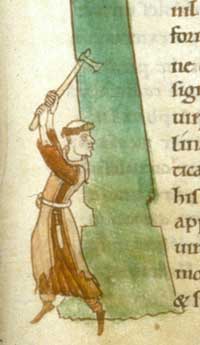|
|
You are here:
Cistercians in a changing world: lost
perfection
(3/5)
From the second half of the twelfth century the
Cistercians’ lofty reputation in Britain began to fade; this
was perhaps inevitable given the tremendous growth of the Order
and the subsequent difficulties monasteries had in maintaining standards,
and resisting the influence of benefactors and neighbours. Most
criticism concerned their insatiable appetite for land and possessions;
as one contemporary remarked:
and so all the whole earth is full of their possessions; and
though the gospel does not permit them to take thought for the
morrow, they have such a reserve of wealth accruing from their
wealth that they could enter the ark in the same spirit of security
as Noah who had nothing left outside to look to.(1)
Their houses were not always established in remote places, as stipulated
by the Order, and occasionally, the native inhabitants were
dispossessed,
leading to complaints that they make a solitude that they may be
solitaries. Their critics depicted them as greedy and grasping
predators
who would steal, sabotage or trick to attain land. Other, more
moderate, commentators also noted their greed. Archbishop Richard
of Canterbury
(1174-81), an admirer of the Cistercian Order, wrote to the
General Chapter complaining of the White Monks’ reputation
for avarice in Britain, and how they were blamed for seizing the
property of others.(2) When Ranulf
de Glanvil, chief justiciar during Henry II’s reign, was
deciding where he should leave his money after his death, he rejected
the
Cistercians because of their greed for land, the Cluniacs for gluttony,
and opted for the Augustinian Canons instead. Ranulf’s impression
of the Cistercians was informed by his experiences in the law-courts,
where the number of White Monks convicted for moving boundary markers
and forging charters – to secure land – far exceeded
any other order.
|







